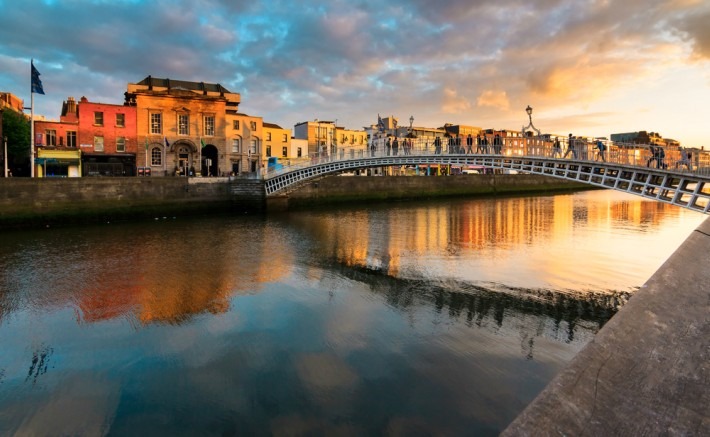Today we look at the latest property market headlines making waves in Ireland.
County prices revealed
The results of a new survey of the Irish property market by GeoDirectory Ireland have revealed the latest average asking prices for properties across the Emerald Isle.
The survey revealed that if your budget is less that $100,000 (approx. £84,227) then there are just three counties in Ireland where you should set your sights: Longford where the average asking price is €80,357 (approx. £67,687), Roscommon at €88,317 (approx. £74,391), and Leitrim at €91,608 (approx. £77,160). These prices are all well below the national average of €232,862 (approx. £196,193), although if you remove Dublin prices from this equation, the national average drops to €168,078 (approx. £141,605).
The highest property prices in Ireland are found in Dublin, Wicklow and Kildare.
At the opposite end of the price spectrum, the highest property prices in Ireland are found in Dublin at €380,237 (approx. £320,347), Wicklow €315,564 (approx. £265,854) and Kildare €255,967 (approx. £215,673).
The results of this survey also revealed the counties with the highest vacancy rates, which included Leitrim, Donegal and Kerry.
The following table reveals average property prices, housing turnover rates, and vacancy rates across every county in Ireland.
| COUNTY | AV. PROP PRICE | HOUSING TURNOVER RATES | VACANCY RATES |
| Carlow | €140,756 | 1.9% | 10.2% |
| Cavan | €109,605 | 2% | 18.2% |
| Clare | €133,215 | 1.9% | 19.8% |
| Cork | €205,445 | 2.1% | 12.3% |
| Donegal | €112,893 | 1.5% | 1.5% |
| Dublin | €380,237 | 2.5% | 6.9% |
| Galway | €172,273 | 2.2% | 15.5% |
| Kerry | €146,480 | 1.7% | 24.2% |
| Kildare | €255,967 | 2.5% | 6.3% |
| Kilkenny | €174,207 | 1.8% | 9.4% |
| Laois | €140,763 | 1.7% | 10% |
| Leitrim | €91,608 | 2.3% | 29.5% |
| Limerick | €148,138 | 2.2% | 10.7% |
| Longford | €80,357 | 2.1% | 17.5% |
| Louth | €155,300 | 2.2% | 9.7% |
| Mayo | €115,742 | 1.7% | 24% |
| Meath | €229,314 | 2.1% | 7.5% |
| Monaghan | €120,835 | 1.3% | 12.9% |
| Offaly | €118,829 | 1.7% | 9.7% |
| Roscommon | €88,317 | 1.9% | 21.6% |
| Sligo | €128,637 | 1.7% | 20.8% |
| Tipperary | €129,473 | 1.7% | 12.7% |
| Waterford | €136,566 | 2.4% | 14.6% |
| Westmeath | €122,146 | 2.5% | 11.6% |
| Wexford | €140,364 | 2% | 19.1% |
| Wicklow | €315,564 | 2.3% | 8.5% |
Property tax hikes?
Should the Irish Government make the decision to scrap the Universal Social Charge (a tax on income that has been in force since 2011), they have been warned they may need to increase property tax by as much as 600%, while also increasing prices of tobacco, petrol and diesel.
The documents revealing these predictions have been drawn up by the Irish Department of Finance, and they expressly warn against the removal of the levy, stating that it would be a backwards step.
In place of scrapping the USC levy entirely, the Department of Finance has proposed four alternatives that could replace the revenue should the Government proceed with abolishing this charge.

Dublin has one of the highest property prices.
1 – Increase local property tax
Current local property taxes would need to be increased six fold, stamp duty on commercial property hiked up by 1.75 percent, and stamp duty increased by 3 percent. Additionally, Capital Gains Tax would need to be increased to a minimum of 38 percent, and Capital Acquisitions Tax to 43 percent from the 33 percent it sits at currently.
2 – Increase petrol, alcohol and tobacco prices
To account for the levy being scrapped the Department of Finance propose increasing the price of diesel and petrol by 18 percent. Excise duty on a pint would need to be increased and they would need to reintroduce the 13.5 percent VAT rate for the tourism sector, as well as raising all other forms of VAT to 25 percent.
3 – Increase income tax rate
They propose increasing the lower income tax rate from 20 to 25 percent, and the 40 percent income tax bracket to 45 percent.
4 – Increase corporation tax
Ireland’s current corporation tax sits at 12.5 percent. The Department of Finance suggests increasing this to 19.75 percent.
It is yet to be seen whether the Irish Government will move forward with plans to phase out the Universal Social Charge, although Fine Gael (Ireland’s largest political party) are in favour of the move.

